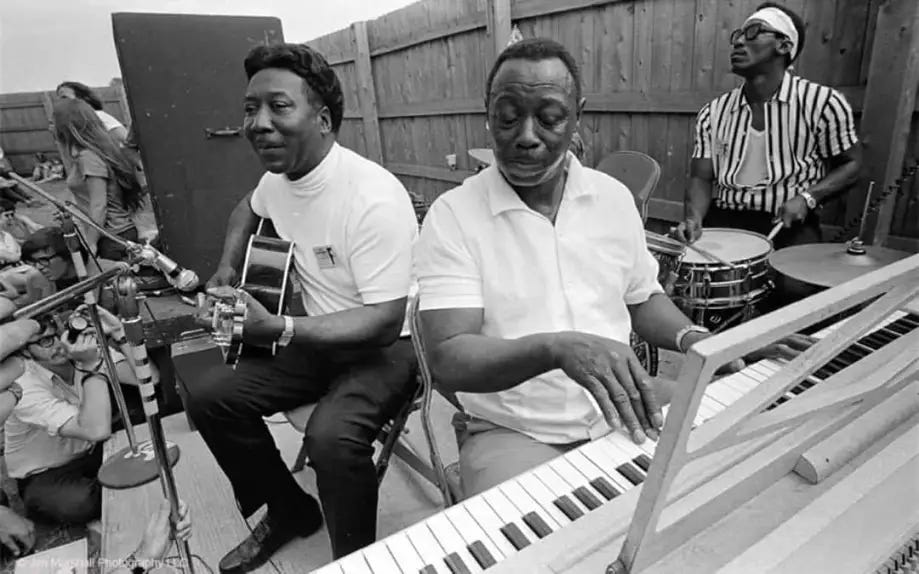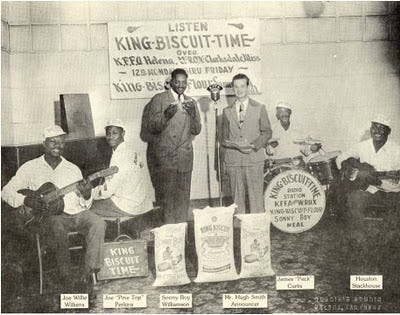The oldest-ever Grammy winner, Pinetop Perkins was 97 when he accepted the award with Willie “Big Eyes” Smith for best traditional blues album (Joined at the Hip) in February 2011. Who else could win a competitive award six years after their Lifetime Achievement honor?
Rejuvenated and unretired after a move to Austin eight years earlier, Pinetop’s goal was to make it to 100, and he almost did, dying of a heart attack the month after the Grammys. Perkins smoked every day since 1922, ate all his meals at McDonald’s and drank whiskey until he was 85 and ordered to undergo treatment after being arrested with an open container.
At his funeral, fellow Muddy Waters sideman Bob Margolin said, "I thought Pinetop would live forever, and he came closer than anyone I've ever known."
His playfulness used to sometimes annoy Muddy, who said Pinetop was “once a man, twice a child.” But Margolin said, “you couldn’t be mad at Pinetop. He lived in the moment ... which could be why he lived so long."
A typical scene at Antone’s in 2010: The crowd stepped back a bit to make a path for the old man with a cane. For a few minutes, nobody cared what was happening on the stage. A burly man gently elbowed his friend, who said, "I know." The wisp of a man in a yachting cap took a chair near the shoeshine stand, while his assistant pulled over a table and took CDs and DVDs out of a black bag and laid them out. “Mr. Pinetop’s in the house,” someone said as the blues legend lit a cigarette. A woman approached the table and leaned over to hug Pinetop, who said, “You got what I need (pause), but I’m too old to do anything about it.”
Everybody laughed, and no one told Pinetop he couldn’t smoke in the club.
As the piano player for Sonny Boy Williamson’s "King Biscuit Time" radio program in the ‘40s, and his 11 years with Muddy Waters, Pinetop has earned his own chapter in blues history. But like that relative youngster Willie Nelson, 20 years his junior, Pine was not one to sit at home and think about all he'd accomplished. He went out almost every night of the week, with his roommate and hired attendant Barry Nowlin, usually hitting Antone's, and Nuno's on Sixth Street, sometimes staying out for just an hour, sometimes till well past midnight.
Although he didn't have the chops that turned Muddy’s head in 1969, when he pulled him out of Earl Hooker’s band to replace Otis Spann, Perkins could still hang with young blues bands, whose members often got on their cell phones during breaks. "You're not going to believe who I just played with!"
Cab-driving musicians volunteered to be on call to take Pinetop to “McDaniel’s,” as he called McDonald’s, or to the airport, where he’d be greeted at the curb with a boarding pass. “We don't even have to ask," his manager Pat Morgan said in 2010.
"Pinetop is the classic Chicago blues piano player," summated Marcia Ball, who was blissfully present every night when the Muddy Waters Blues Band, with Perkins on piano, played for a week at the original Antone's soon after it opened on Sixth Street in 1975. That cover charge was tuition for a crash course in Chicago blues.
Club owner Clifford Antone, all of 26 at the time, remained close to Perkins through the years, and when he heard that the blues great was living in LaPorte, Ind., with no money and one to look after him, he and others in Austin, including former Muddy Waters harmonica player James Cotton, arranged for Perkins to move here in late 2003.
"Their idea was 'Let's get Pinetop down here so we could put our arms around him,'" said Nowlin. Antone did that with other blues pioneers, including Hubert Sumlin, the great Howlin’ Wolf guitarist, who came down for extended stays when he was down. Adulation in the best medicine. You’d see Sumlin, who invented many of the blues and rock riffs we take for granted, at Antone’s every night with a big smile. He’d get up and jam, but the younger hotshot guitarists would be careful not to show Hubert up. That was against the code.
Morgan said Perkins was in bad shape on his Austin arrival. A former associate had tricked Pine into signing away his power of attorney and fleeced him to the tune of about $200,000. He’d also been in a car accident due to poor eyesight.
Grammy's MusiCares assistance program stepped in to help pay emergency expenses for Perkins. Needing a full-time care provider, he found Nowlin in the phone book, and offered him the job by saying, “I want you to be my boy."
One of Nowlin’s jobs the first two years was to drive Perkins and Clifford Antone to the clubs at night. One of the stops was the Broken Spoke to hang out with James White. If the honky tonk band had a piano, Pinetop would usually sit it for a boogie-woogie number that would satisfying jitterbuggers. He played along to country, too.
"For me, Austin's been a place where we all came because there's a pure love of music, with no discrimination of styles," Marcia Ball said. "To see Pinetop at the Broken Spoke just tied together so much of what Austin's about musically."
Perkins and Antone were almost inseparable. "It was really an ageless thing," said Clifford's sister Susan. "When Clifford died (in May 2006), Pine was devastated." Missing his friend, Perkins thought about moving away, but couldn’t leave Austin’s love.
What the town got was a walkin', talkin', boogie-woogie-playing monument to the blues. A live counterpart to the Stevie statue. When the Rolling Stones played Austin for the first time, at Zilker Park in October 2006, the local attraction they most wanted to see was Pinetop Perkins backstage at their show.
It was Perkins, after all, who helped lay down the blueprint for what Memphis producer Sam Phillips called the first rock 'n' roll record in 1951. "Rocket 88" is credited to Jackie Brenston and the Delta Cats, a band that didn't exist, but it was actually the work of Ike Turner's Rhythm Kings with Brenston on vocals. The driving tune about a powerful car was recorded in the same Memphis studio that would give birth to Elvis Presley's yelp three years later. Turner's idol and mentor growing up in Clarksdale, Miss., was Pinetop Perkins, who taught Ike how to set the rhythm with his left hand on the piano, while aping horn lines with his right hand.
Born in Belzoni, Miss., in 1913 and raised in the Honey Island area of the Delta bottoms, Joe Willie Perkins was originally a guitarist but switched to piano when he hurt his left hand in a bar fight and had trouble gripping the neck of a guitar. He got his nickname from “Pinetop’s Boogie-Woogie,” a 1929 hit by Clarence “Pinetop” Smith, that Perkins covered in 1953. The original “Pinetop” was shot to death at a dance in Chicago just weeks after his hit was released.
Austin fans were always asking Pinetop about some of the all-time Delta greats, rattling off names like Robert Johnson, Son House, and Elmore James. He would just nod and say, "I knowed 'em."
We can say the same thing about Pinetop Perkins and Hubert Sumlin, who both passed away in 2011. They walked among us and made us proud to belong to a city that loved and respected blues legends in their final years.
Pinetop’s jampacked funeral was in Austin, not Chicago, where he lived most of his life and made his name. He’d outlived all his friends and relatives. His family was here.








I saw Pinetop a few times but only had one personal interaction with him. I was standing outside Broken Spoke at the Don Walser tribute shortly after his death with Slaid Cleaves and a friend of mine who is a very large man. Pinetop walked up and shook Slaid's hand and then made a VERY disparaging remark about my friend's size. He walked in and my friend said "Who was that asshole?" I said "Pinetop Perkins. Living legend." The answer was "Well, he will be memorium if he talks about my weight like that again." Ha. I walked away thinking I got the Pinetop experience. He didn't give an eff.